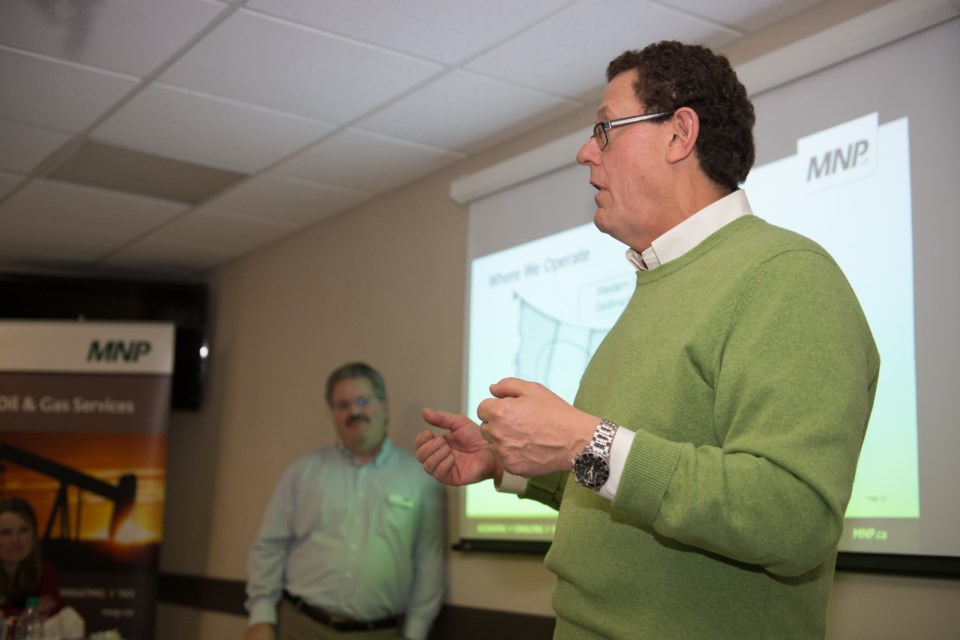Calgary – David Yager, one of the leading editorial commentators in the Canadian oilpatch, finally got so fed up with the way the oil industry has been denigrated in recent years, he determined to write a book about it.
The result is From Miracle to Menace: Alberta, a Carbon Story, released on April 10. The self-published book is currently available as an ebook online at miracletomenace.ca, but a printed version will soon be available. Yager had to interrupt the interview briefly to take delivery of hundreds of pound worth of hardcopies.
Yager’s early career included being co-owner of The Roughneck, an oilfield trade magazine. Since then he’s been a founder, executive and director of three successful TSX-listed oilfield service companies. When he divested the most recent, HSE Integrated Inc., he went to work for MNP as their in-house oilfield services expert. These days he writes for Energy Now and is looking forward to retirement. He works as an energy policy analyst, consultant, executive and writer.
But for 30 years Yager has wanted to write a book, and the current politics around oil and the carbon economy got him wound up enough to do just that.
Speaking to Pipeline Newson April 18, he noted he’s going to have to do an update as a result of the “merciful disappearance of the NDP” as the government of Alberta in the election of two days earlier. Yager’s politics are well-known, as he is formerly president of the now-defunct Wild Rose Party of Alberta.
And politics is definitely a part of this book. He noted that oil first became political in a military sense, when the Royal Navy converted from coal to oil-fueled warships.
Historically, Yager noted, “Most of the (political) battles were about not enough oil, and it cost too much.
“Now it’s the completely opposite. It doesn’t cost enough and there’s too much of it. Hence they’re bringing carbon taxes in.”
Yager is wary of people making money on climate change without changing the atmosphere’s content.
“This is class warfare disguised as climate change,” he said.
The first line of the book is, “The current debate about climate change, and what mankind should do about it, has deteriorated to the point of absurdity.”
Yager noted, “We’re going to destroy the Canadian economy for votes. This is the fraud of the whole thing.”
Yager looks back at the Alberta economy, starting from the Leduc oil strike. He noted that from 1971 to 205, 23 per cent of the province’s revenue came from non-renewable resource income.
The book recounts the history of how we came to this point, with the 1972 United Nations Stockholm Summit legitimizing environment non-governmental organizations such as Greenpeace and the Sierra Club as actors on the world stage, through the Rio Earth Summit of 1992 to today.
He points out that early on, India linked the environment with social justice, essentially saying the West screwed up the world, and they weren’t going to pay for it.
To pick a turning point, where the climate change discussion went from conferences and scientists to mainstream, Yager points to the 2006 movie by Al Gore, An Inconvenient Truth, which won both an Oscar and the Nobel Peace Prize for Gore.
“They started showing it in classrooms,” he said, and those kids are now of voting age.
“Climate change moved from scientists and diplomats to the mainstream.”
Yager included a chapter on the internet, and he touched on the diminishment of conventional media, which used to employ extensive fact-checking.
“All of a sudden, there were no fact checkers,” he said, nothing that a majority of young people get all their news from social media now.
The results is a “parallel universe,” where the City of Victoria brings in cruise ships, but wants oil companies to pay it for climate change expenses.
Since climate change is where the money is, “All the ENGOs reinvented themselves as climate change experts.”
He doesn’t spare the politicians who bought into this, either, pointing to current federal Environment and Climate Change Minister Catherin McKenna, former Ontario Premier Kathleen Wynne and former Alberta Premier Rachel Notley.
“Ontario loses its mind,” he said.
It wasn’t always this way. The first pipeline from Edmonton to the United States, the Interprovincial Pipe Line (now known as Enbridge), was conceived, permitted and built in 20 months, and that included passing through Alberta, Saskatchewan, Minnesota and Wisconsin. The Edmonton to Burnaby Trans Mountain Pipeline was accomplished in 18 months.
“There was a time this was a country, and that’s how the country got built,” Yager said.
Yager said that global fuel demand is rising, and yet Alberta has become ground zero for what the world is supposed to become – the decarbonized economy.
“If they’re successful, this will be the largest economic disruption in history. Didn’t anybody tell you?” he said ironically.
“The fact is, we’re not going out of the oil business anytime soon,” Yager said, adding “We don’t have a Plan B.
“I don’t think that a lot of Albertans really understand how the economy works.”
Yager said the reason Alberta has three million more people than either Manitoba or Saskatchewan is directly because of its carbon-based economy. It didn’t even get good soil compared to its Prairie province brethren.
Canada is the fifth largest oil producer in the world. “Alberta without oil is Manitoba with mountains,” he said.
“Decarbonizing means destroying the economy of Alberta,” he said, noting downtown Calgary would make Detroit look good in comparison.




